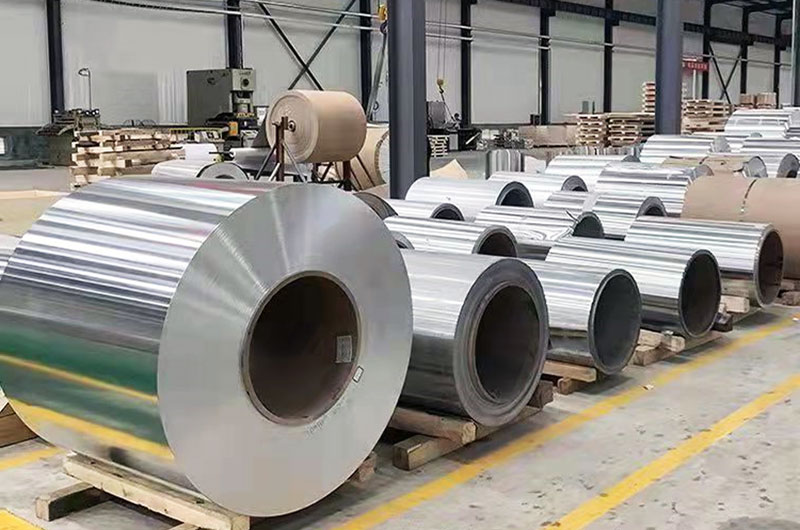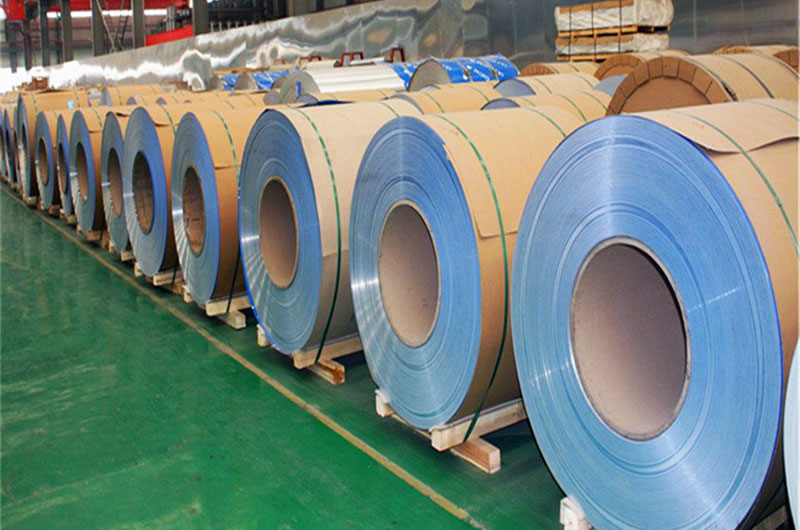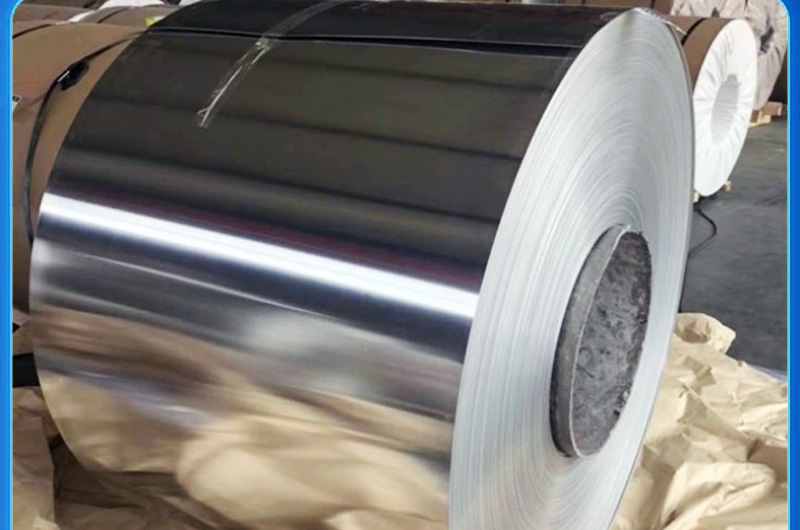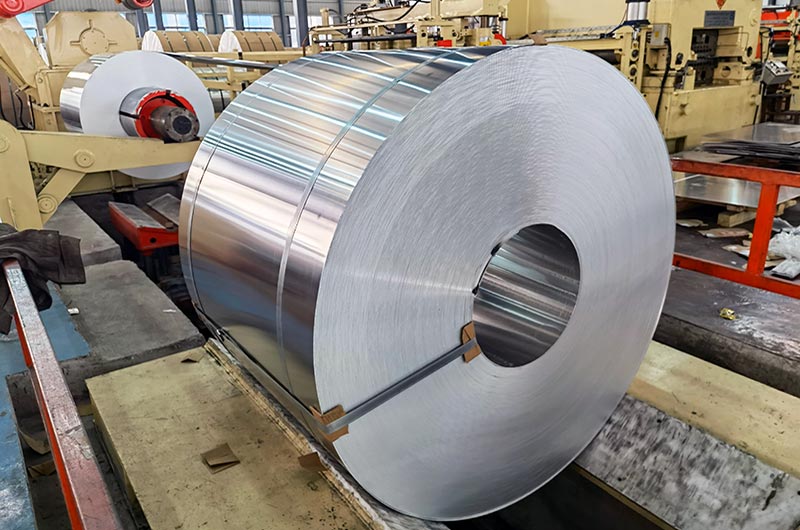Aluminum coils are classified based on various factors, including their alloy composition, thickness, temper, and application. The following are general classifications of aluminum coils:
Alloy Classification
1000 Series Aluminum Coils
The 1000 series aluminum plate is also called pure aluminum plate. Among all series, the 1000 series belongs to the series with the largest aluminum content. The purity can reach more than 99.00%. Since it does not contain other technical elements, the production process is relatively simple and the price is relatively cheap. It is currently the most commonly used series in conventional industries.
Most of the 1000 Series aluminum coils circulating on the market are:
- 1050 aluminum coil
- 1060 aluminum coil
- 1100 aluminum coil

2000 Series Aluminum Coils
The 2000 series aluminum plate is characterized by high hardness, among which the copper element content is the highest, about 3-5%. 2000 series aluminum plates are aviation aluminum materials and are not commonly used in conventional industries. With the development of the aerospace industry, the production technology of 2000 series aluminum plates will be further improved.
Most of the 2000 Series aluminum coils circulating on the market are:
- 2024 aluminum coil
- 2014 aluminum coil
3000 Series Aluminum Coils
3000 Series Aluminum Coils can also be called rust-proof aluminum. my country's 3000 series aluminum production technology is relatively excellent.
3000 series aluminum is mainly composed of manganese element. The content is between 1.0-1.5. It is a series with better anti-rust function.
It is commonly used in humid environments such as air conditioners, refrigerators, and car bottoms. The price is higher than the 1000 series, and it is a more commonly used alloy series.
Most of the 2000 Series aluminum coils circulating on the market are:

5000 Series Aluminum Coils
5000 series aluminum coils belong to the more commonly used alloy aluminum coil series. The main element is magnesium, and the magnesium content is between 3-5%. It can also be called aluminum-magnesium alloy.
The main features of 5000 Series Aluminum Coils are low density, high tensile strength and high elongation. The weight of aluminum-magnesium alloy is lower than other series under the same area. Therefore, it is often used in aviation, such as aircraft fuel tanks. It is also widely used in conventional industries.
The processing technology of 5000 Series Aluminum Coils is continuous casting and rolling. It belongs to the hot-rolled aluminum plate series and can be processed by deep oxidation. In my country, the 5000 series aluminum coils are one of the more mature aluminum coil series.
Most of the 5000 Series aluminum coils circulating on the market are:
- 5052 Aluminum Coil
- 5005 Aluminum Coil
- 5083 Aluminum Coil
- 5A05 Aluminum Coil
6000 Series Aluminum Coils
Represents 6061, which mainly contains two elements: magnesium and silicon, so
6000 Series Aluminum Coils combine the advantages of 4000 Series and 5000 Series.
Most of the 6000 Series aluminum coils circulating on the market are:
- 6061 aluminum coil
- 6063 aluminum coil
6061 is a cold-processed aluminum forged product suitable for applications requiring high corrosion resistance and oxidation resistance. Good workability, excellent interface characteristics, easy coating, and good processability. Can be used on low voltage weapons and aircraft joints.
General features of 6061: excellent interface characteristics, easy coating, high strength, good workability, and strong corrosion resistance.
Typical uses of 6061 aluminum: aircraft parts, camera parts, couplers, ship accessories and hardware, electronic accessories and connectors, decorative or various hardware, hinge heads, magnetic heads, brake pistons, hydraulic pistons, electrical accessories, valves and valve parts .
7000 Series Aluminum Coils
7075 belongs to the aviation series. It is an aluminum-magnesium-zinc-copper alloy. It is a heat-treatable alloy. It is a super-hard aluminum alloy and has good wear resistance. 7075 aluminum is stress-relieved and will not deform or warp after processing. All oversized super All thick 7075 aluminum has been ultrasonically detected to ensure there are no blisters or impurities.
7075 aluminum has high thermal conductivity, which can shorten molding time and improve work efficiency. The main feature is its high hardness. 7075 is a high-hardness, high-strength aluminum alloy that is often used in manufacturing aircraft structures and futures. It requires high-stress structural parts and mold manufacturing with high strength and strong corrosion resistance.
Most of the 7000 Series aluminum coils circulating on the market are:
7075 aluminum coil

8000 Series Aluminum Coils
The more commonly used ones are 8011 which belongs to other series. In my memory, aluminum coils are mainly used for making bottle caps. They are also used in radiators, and most of them are aluminum foil.
Thickness Classification
Aluminum coils are available in a variety of thicknesses, typically ranging from very thin to thicker. Common thicknesses are:
- 0.2mm Aluminum Coil
- 0.3mm Aluminum Coil
- 0.5mm Aluminum Coil
- 1.0mm Aluminum Coil
Temper Classification
The tempered state of the aluminum coil indicates its hardness and strength. Common Tempers include:
O (annealed): Soft and fully annealed for maximum ductility.
H12, H14, H16, H18: Strain hardening tempers with increasing hardness and strength levels.
T4, T6, T651: Heat treated condition that provides enhanced strength and hardness.
- O Aluminum Coil
- H12 Aluminum Coil
- H14 Aluminum Coil
- H16 Aluminum Coil
- H18 Aluminum Coil
- T4 Aluminum Coil
- T6 Aluminum Coil
- T651 Aluminum Coil

Surface Finish Classification
Aluminum coils are available in a variety of surface finishes, including milled finishes, anodized finishes, painted finishes, and embossed patterns, among others.
Classify by Applications
- Building and Construction: For roofing, cladding and construction applications.
- Transportation: For automotive, aerospace and marine applications.
- Packaging: used to make cans, lids and other packaging materials.
- Electronics: For electrical conductors and components.
- Household Products: Used in the manufacture of cookware, utensils and utensils.
Coils are available in various widths and lengths to suit specific manufacturing processes and applications.
The classification of aluminum coils can become more specific based on industry standards and specific product requirements. When selecting aluminum coils, it is important to consider the alloy, temper, thickness and surface finish that best suits the intended use to ensure optimal performance and durability.

